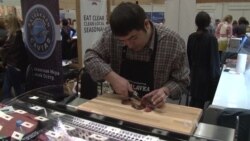The first exhibition for foreigners, which opened in Moscow Friday, comes at an awkward time and place.
In the same hall where President Vladimir Putin has his annual briefings, and has recently levied much criticism at the West, rows of booths were set up for businesses catering to mainly Western foreigners.
Russia's shrinking economy and tensions with the West have led hundreds of thousands of foreigners to leave the country for better opportunities.
Russia’s economy shrank by 3.7 percent last year on low oil prices and Western sanctions, and is expected to contract another 1 percent this year.
In the last two years, the number of Germans in Russia dropped from 350,000 to 106,000 while the number of Americans fell from 221,000 to 46,000, and the number of British shrank from 179,000 to 28,000.
Businesses have been forced to downsize, relocate, or close. Companies catering to foreigners are suffering.
Alexey Filipenkov is with Visa Delight, a company that arranges and facilitates visas for foreigners. “Many of our clients, they decide to decrease the number of expats here in Russia because, you know, they have to pay them salary in [foreign] currency and it's very expensive for many companies.”
Filipenkov says his company has had to become more efficient to remain competitive. With a smirk, he thanks Russia’s government for changing visa rules so often. He says it keeps them in business.
Russia's blocking of Western food imports added to economic woes by pushing up inflation and made European style cheeses and meats hard to come by; but, they also created opportunities for local producers looking to cater to Western tastes.
Grant Zozulinsky is owner of ‘Meat to Eat,’ a company he started six months ago for butchering and aging beef and pork products. Zozulinsky says he lived in Wisconsin as a teenager, always worked on farms, and wanted to see high quality meat production in Russia. He says the ban on Western imports gave his company a boost. “Once we're in this niche, people can compare the products and they can choose what they like best. That's all. The target is to get into this niche and then, I mean, it will be easier.”
Organizers of the exhibition argue it is the opportune time to get in on what is becoming Russia's ground floor.
Geral Autier, co-founder and general director of the “Foreigners Life” exhibition, said he was asked why they would have such an event when it seems like all the foreigners are leaving Russia.
“The answer is simple,” he told an audience at the opening forum on Friday. “We believe this is the right time to provide foreigners with product[s] and services, especially when it's difficult to find them. We believe this is the right time to invest in Russia, especially when some investor[s] are doubting it.”
Some foreigners remaining in Russia are optimistic that the sweet taste of success will return. Peter Richter, a Belgian expat living in Moscow for more than 20 years, attended the exhibit. He believes Russia’s economy will recover and says those foreigners and businesses that stay will benefit.
“If you stick around, you obviously get a ...gain, a competitive edge on those that have left,” he says. “I mean, it was the same thing in the ...after the '98 crisis when ...lots of companies left the country. Those who stuck around, they eventually grew much faster than those who had to fight their way back into the market.”
Before Russia's economic crisis, Moscow was one of the most expensive cities in the world.
But while Russians are kicked around by their tumbling currency, the ruble, foreigners paying in dollars or euros are finding life here a lot more affordable.









